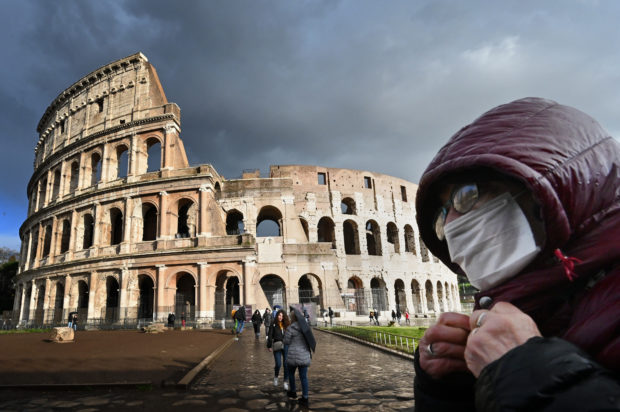PARIS, France – Italy on Sunday recorded its biggest daily death toll from the novel coronavirus, which has now claimed over 6,000 lives worldwide, forcing European governments to further tighten controls.

A man wearing a protective mask passes by the Coliseum in Rome on March 7, 2020 amid fear of Covid-19 epidemic. – Italy on March 6, 2020 reported 49 more deaths from the new coronavirus, the highest single-day toll to date, bringing the total number of fatalities over the past two weeks to 197. (Photo by Alberto PIZZOLI / AFP)
The number of fatalities in Italy shot up by 368 to 1,809 — more than half of all the cases recorded outside China.
The Vatican took the drastic step of cancelling Easter week celebrations as northern Italian leaders warned they were running out of beds and artificial respirators.
Pope Francis left Vatican City on Sunday “on foot, as if on a pilgrimage” to pray in one of Rome’s cathedrals for victims of the coronavirus pandemic, the Vatican said.
Across France and Spain, which have also become European virus hotspots, cafes, shops and restaurants closed.
France had ordered the closure of all non-essential businesses, while Spain went a step further, banning people from leaving home except to go to work, get medical care or buy food.
Cases also spiked in Germany which will introduce border controls with France, Austria, Switzerland, Luxemburg and Denmark from Monday.
– Chaos at US airports –
The United States imposed a travel ban on countries in Europe’s Schengen free-movement area last week, and has since added Britain and Ireland to the list.
The new restrictions threw airports into disarray, with passengers complaining of massive queues as staff battled with the new entry rules and stipulations on medical screening.
US President Donald Trump tested negative for the disease, having come into contact with several members of a Brazilian presidential delegation who have since tested positive.
Treasury Secretary Steven Mnuchin said Sunday the impact of the pandemic was producing a “slowdown” in the American economy, but he did not expect a full-blown recession.
The number of officially recorded novel coronavirus cases globally stood at 163,930 with 6,420 deaths, across 141 countries and territories at 1700 GMT Sunday, according to a tally compiled by AFP from official sources.
The death toll in Europe passed 2,000 on Sunday.
The disease has now hit all global regions, ripping up sporting and cultural calendars, shaking the stock markets and businesses — particularly airlines — and prompting often contradictory responses from governments.
– China to quarantine international travellers –
China — excluding Hong Kong and Macau — where the epidemic was declared in late December, has to date declared 80,844 cases, for 3,199 deaths, with 66,911 people recovered.
The country declared 20 new cases and 10 new fatalities between Saturday and Sunday, a fraction of the latest Italian figures.
China is now imposing its own crackdown on international travellers — all will be put into quarantine on arrival — after linking most of its new infections to those coming from abroad.
In Iran, where the overall death toll stands at 724, the world’s third-worst toll after China and Italy, officials urged people to avoid public gatherings.
Britain cancelled local elections and hinted that it would follow most other affected European nations and ban mass gatherings.
On the other hand, France allowed municipal elections to go ahead on Sunday even as officials imposed a drastic nationwide shutdown on all non-essential businesses and promised to progressively restrict long-distance travel.
The risk from voting for the elderly was no greater “than going shopping”, insisted Jean-Francois Delfraissy, chairman of France’s coronavirus science council.
The French luxury group LVMH said it would begin producing sanitising hand gel at three of its perfume and cosmetics sites in France, for distribution to hospitals fighting the virus pandemic.
– Dutch close cannabis cafes –
The Dutch government ordered the closing of all schools, bars, restaurants, sex clubs and cannabis cafes in a bid to fight the spread of the new coronavirus.
Several countries have announced bans on foreigners entering their countries.
Austria banned gatherings of more than five people on Sunday, telling citizens to stay in unless absolutely necessary.
Norway announced it would shut ports and airports with international connections on Saturday before retreating a day later and saying although foreigners would be turned away the facilities would remain open.
Portugal announced it was limiting gatherings to no more than 100 people in a bid to slow the spread of the deadly coronavirus.
The spread of the virus has spooked even those countries without significant outbreaks. Australia and New Zealand have said that anyone arriving from overseas must self-isolate for two weeks.
In Africa, which has been spared the worst of the disease, half a dozen countries announced new infections over the weekend.
The announcements sparked restrictions on gatherings in Rwanda, panic-buying in the Seychelles and furious recriminations in Zimbabwe — a country yet to register a single case.
“Coronavirus is the work of god punishing countries who imposed sanctions on us,” said Zimbabwe’s defence minister Oppah Muchinguri on Saturday.
Kenya unveiled a series of strict measures, blocking entry to the country to all except citizens and residents and shutting schools as the number of confirmed cases rose to three.
South African President Cyril Ramaphosa announced the closure from Wednesday of the country’s borders to all foreign nationals from countries hit badly by the outbreak.
Latin America has also recorded only small clusters of infections, but Colombia shut its border with Venezuela over a rise in cases there.
burs-jxb/pvh/jj
© Agence France-Presse